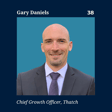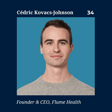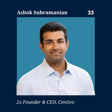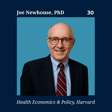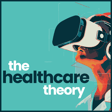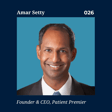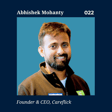Introduction to Healthcare Theory Podcast
00:00:00
Speaker
Welcome to the Healthcare Theory Podcast. I'm your host, Nikhil Reddy, and every week we interview the entrepreneurs and thought leaders behind the future of healthcare care to see what's gone wrong with our system and how we can fix it.
Meet Mitri Joshi, CEO of Avon Health
00:00:15
Speaker
Today we're speaking with Mitri Joshi, the founder and CEO of an EMR platform called Avon Health, which is using AI to completely reconfigure what an EMR platform is actually meant to do in just for individuals in healthcare. So thank thank you, Mitri, for coming on today, and welcome to the Healthcare care Theory.
00:00:30
Speaker
Thank you so much for Nikhil for having me. Really excited to be here. Of course. And I'm also super excited. But before we start off, you've of course been working with AI and technology and healthcare care for quite a while across like many different verticals.
Mitri's Passion for Healthcare and Career Journey
00:00:42
Speaker
What kind of brought you to healthcare care in the first place? We're super curious to hear your story. Yeah. um So I've been interested in the health care space for a really long time, as long as I can imagine. um Growing up, ah you know, a lot of projects, did a lot of projects in this space.
00:00:55
Speaker
um In college, did my thesis on computer vision to try to restore a functional vision to the blind. So I've always really been interested in tech applied to health care, ah specifically tech to help people with disabilities.
00:01:07
Speaker
um And then have kind of broadened since then. um So after college, went to Microsoft, worked there on their cloud completing and ah ML platform, um you know, learned how to build great products at scale.
00:01:19
Speaker
And then afterwards decided that i really wanted to go back into my roots on the healthcare ML side. um So went to PathAI um there, led the machine learning team there, um where we really worked on I'm bringing ML um for analyzing pathology slides and really improving improving improving the entire clinical trials process.
00:01:38
Speaker
um And then kind of after that, wanted to jump in, started my own company.
Entrepreneurial Roots and Early Ventures
00:01:42
Speaker
um And I had always been in the l health care space for a really long time. So definitely needed the company, wanted to be in something related to health care and tech.
00:01:51
Speaker
Of course. Yeah. pat And Palthia is a great company and they're completely kind of changed what they're doing. Super exciting. But i mean, entrepreneurship is a big step. It's pretty risky. What kind of was there always that seed inside? want to do something on your own, create your own venture. Was it more opportunistic this time?
00:02:06
Speaker
Yeah, no, I mean, part of it was always there. um You know, I grew up in the Bay Area and I used to like the where, you know, it's obviously very entrepreneurial. I used to always joke that like everywhere else um in the country, when you turn 16, you get a car. In the Bay Area, you get a company ah um because literally everybody had a company, um including me.
00:02:25
Speaker
um And so, you know, even kind of growing up, had started a company to help the blind navigate through indoor buildings um and, you You really got to see the like the great impact that you could have building with just a computer um and the ability to like actually transform lives.
Challenges in EHR Systems and Market Fit
00:02:42
Speaker
um And so that like the the desire to build something, to build a company has always been there um just so from the get go. Awesome. And that that makes a lot of sense. And kind of can you kind of before you built Avon Health, I imagine it took a while to kind of figure out where you wanted to create that impact because it's not only an investment for VCs that comes along later, but an investment of your time.
00:03:04
Speaker
um like What was the problem that you ended up finding with Avon Health and where did you kind of see that across the process in your career? Yeah, so there was a couple of things that really led to the genesis of Avon.
00:03:15
Speaker
One was i had started another company before, ah which is more on like the personal health records space. um And, you know, essentially trying to do something that a lot of people have done, tried to do before has never really succeeded, which is allowing patients to have all of their health record records in one location um and kind of through that entire process.
00:03:34
Speaker
got to see how difficult it was of just like pulling all these health records, how difficult it was working with all of these EHR systems. um And so there was definitely like an acute pain point that we'd faced on our previous company.
00:03:47
Speaker
um The other thing that I really wanted to focus on this time around was just really good founder market fit. Right. There are a lot of really, really interesting problems in health care. um But I'm probably not the right person to solve some of those problems.
00:04:00
Speaker
You know, like if you are building really cool tools for pharma, um I think you there's a lot of things that you need, a lot of insights into the pharma space, a lot of network in the pharma space um that somebody that's like maybe just grown up in that system knows a lot better than maybe I would.
00:04:16
Speaker
And so it's the one thing that i really thought about a lot before starting this company is like, where are my background and our team's background uniquely suited ah suited where we could do a better job than anybody else in the space?
Innovative Solutions in EMR Systems
00:04:28
Speaker
And all of that really always came back down to EMRs. You know, building an yeah EMR is a very highly technical problem um of how do you build something that's scalable, modular, like very easy to use.
00:04:39
Speaker
um And this is a space where we know a lot of like digital health companies, a lot of carry delivery companies that are doing really amazing things. and could benefit from a better EHR. um And so kind of given all that, given our background and already facing this problem in our previous company, and also knowing that this is a problem that we could tackle better than anybody else, um was what led to like the initial idea of like, okay, should build um we should build a better EHR.
00:05:04
Speaker
um Specifically how we came about this idea of more of a like AI forward, um customizable yeah EHR was our initial approach Our initial idea was actually building more of a headless EHR.
00:05:17
Speaker
Back when we started, headless EHRs were a huge rage. um Everybody was saying that this was gonna be like the future of healthcare. um So we we saw all of that and we're like, okay, this is actually really cool. Like we should build a headless EHR. We went and talked to a lot of companies that were, you know, Series D, Series E companies.
00:05:34
Speaker
And we're like, hey, like, you know, we know that you're super frustrated with your EHR right now. Would you use a headless EHR? And every single one of them was like, no, we would not. um Because yes, we are really frustrated with our yeah EHR, but we don't have enough time to build an entire EHR from scratch or on top of these APIs.
00:05:54
Speaker
um That's a lot a lot of work that we just don't have right now. And was like, okay, that's actually really interesting. you know, people are frustrated with their yeah EHR. They feel like it's unflexible. It's not meeting their current needs, but they also don't want to to build on top of APIs completely because APIs, frankly, are like 2% of the work.
00:06:12
Speaker
Rest of the work is really in terms of building that front end. So how do we give people the flexibility to change their yeah EHR and modify it in ways that are more customizable to them, but don't involve them having to rebuild the wheel from like APIs down?
00:06:26
Speaker
um And so that's how we came upon this whole like more like no code, low code approach, where in our EHR, you can use as many things off the shelf as possible as possible. You scheduling, like you want to schedule appointments, you want to order labs, you want to order prescriptions, you want to bill insurance, you can all ah use all these modules off the shelf.
00:06:45
Speaker
You can customize the UI, you can customize the user experience. And then say there's something that you do in a very unique way. Like maybe the way that you do scheduling is super unique and maybe our no-code platform just isn't flexible enough to handle the way that you want to do scheduling.
00:06:59
Speaker
What you can do is you can actually override our scheduling module with your own custom code. You have access to all the backend variables, backend functions via the public APIs, and then you can run scheduling the way that you want to run scheduling.
00:07:10
Speaker
So that way you can use as many things off the shelf as possible because you know most of the things that you do are going to be similar, pretty unique ah across different clinics, across different health systems. But there's always going to be that 5% of things that you do that is super unique to you that is never going to make sense for a general purpose EHR to support.
00:07:27
Speaker
um And you can build all of those things in right into the EHR via custom code, via custom modules, custom pages.
Role of Feedback and Iterative Development
00:07:34
Speaker
um So that really became kind of our unique insight and kind of like the unique thing like ah kind of our core differentiator based on like all the other EHRs in the market.
00:07:42
Speaker
Of course. And I think this low code, no code technology is something we've seen a lot in workflow product productivity software. And then of course, the customer support. And I can definitely see, I mean, it's great because you can enable enable providers to still get the benefits of technology without the restrictions it may provide.
00:07:59
Speaker
But how do you know it through your conversations? Like how do you kind of validate the solution before you even built it? And what was that kind of approach there and to make sure that people would actually want this and Yeah. thats that It was where the market was kind of looking for.
00:08:10
Speaker
So we've been very lucky that we've had a lot of great like ah demand and design partners from the get go. um So right from the beginning, we had a couple of design partners that we were working with um that were kind of in slightly different, like different spaces.
00:08:25
Speaker
um And all of them gave us a ton of feedback back on the product, about what they needed. um and then because each of these companies was slightly different, like, you know, they were all doing care delivery.
00:08:36
Speaker
but their target populations were different. The types of, uh, the, you know, one of them was like a virtual care. One of them was more in obesity medicine, and mental health. We were also able to triangulate exactly based on the feedback that they were giving to us, um, of like, okay, what is actually a common consistent thing and that should go into the EHR?
00:08:55
Speaker
Um, so really it was just a lot of really, really great early customers that decided to take a bet on us. And I'm so incredibly thankful to them. Um, because, Yeah, without them, we would be nowhere.
00:09:07
Speaker
That's great because you need their feedback too, not just their contracts. And and before, I mean, you had this, of course, this great idea. And it seems like you're kind of building a team before that. You didn't weren't just doing this on your own. You had a great team behind you too.
00:09:19
Speaker
But how you initially like go pursue to build this idea? Did you try to build an MVP as quick as possible? Were you maybe like pushing that out slowly, trying to like have a build a scalable solution? like what was your approach to getting this full platform together? Because I can imagine you're probably still today shipping out new products, shipping out new things that can help your customers.
00:09:36
Speaker
Yeah. So the, yeah, there's always, there's always a ton to build. um So yeah, our approach was, you know just like quick, constant iteration. um And I actually really think that the art of, of building a company becomes, it's in between like really matching product build and distribution build at the same time.
00:09:56
Speaker
And you want to keep them like in like perfect sync with each other, um where you want, obviously you don't want to like get too many customers too early on because your product is just not going to ready enough.
00:10:07
Speaker
And this is like a space where it's really important that your product is good, right? EHRs are not something to take lightly. And so you need to make sure that your product is good, um that it works really well, or else people are not going to be able to take care of their patients properly. And there's going to be a lot of like bad detrimental patient impact.
00:10:23
Speaker
um But also you don't want to focus too much on product and never get customers because then you don't know if you're building the right thing or not. um So a lot of was just keeping in perfect sync. So our initial kind of MVP, and we started off with more just cash pay patients.
00:10:37
Speaker
um So you don't have to deal with insurance. um it's It's a bit more less complicated. um And so really our core modules were around like scheduling, charting, messaging. And we were getting a lot of feedback back from a lot of our early customers about what they needed. And that kind of really drove a lot of the product roadmap.
00:10:54
Speaker
um And then also each of those modules was pretty basic in the beginning, right? So scheduling, you You build like a very like, okay, you can build, you can do, um, you know, you can schedule one time appointments. That's it. You can't do recurring appointments. You can't, you don't build a lot of the but bells and whistles in the Frisco.
00:11:12
Speaker
Um, And so, yeah, we built like a very early version of the product that a lot of customers are using, got a lot of feedback back. um And then actually in the early days, we actually ended up rewriting the code base kind of like, believe it like three times at least um as we figured out, okay, well, we built all of these things up for scheduling messaging forms.
00:11:32
Speaker
And then, And then we hit a point where we're like, okay, actually, like this, this way that we're building it is just not scalable enough. um And we're gonna actually just start from scratch again, because the UI isn't as good as as we want it to be. the the The database design isn't as good as we we want it to be.
00:11:49
Speaker
And if we want to keep scaling this, it's just become harder and harder. And so then we went back to the drawing board, rebuilt everything, shifted all the customers to the new version. um And then we did that another yeah another couple times when we were hitting a point where we were like, okay, this this current way that we're building is just not scalable enough.
Scalable Solutions and Team Strategy
00:12:07
Speaker
And in those conversations, I can imagine must be like difficult to have because, of course, you're sacrificing a lot of your time that you already put up earlier and it's a sunk cost fallacy. um But I mean, can you first, like one, like kind of walk us through at this stage, like who was the team you had behind you? like How did you approach like getting co-founders and or just getting um the founding team? And then from there, what were those conversations like? Because I can imagine people had different skillsets, different backgrounds.
00:12:32
Speaker
But when you're decided to completely completely revamp this, I'd love to hear us some color there. Yeah. So in terms of team, actually, always kept up very lean. um You know, I think especially now with a lot of the like AI tools that have come out with a lot of globalization, think it's become easier, um way way easier to build a product very quickly. And I'm a big believer just,
00:12:53
Speaker
lean teams, getting things done. um And um so just a couple of engineers, um that's it. The team has grown a lot significantly since then. um But back then, very small team. um And actually our approach to everything has been Okay, you wanna do things quickly. So like, for example, every feature that you build um really should take like a day at most to build, right? um And it shouldn't, it's not gonna have all the best bells and whistles, it's not gonna be perfect.
00:13:19
Speaker
But you what you really wanna do is you wanna make sure that your database design is built in a way that's more scalable um so that you can add more functionality in the future. um But like, you know, the actual front end, the actual, it doesn't need to do every single thing yet.
00:13:34
Speaker
um So you get the product of the feature out as quick as possible. You start getting a lot of feedback back and then you can go back and you can iterate and make the feature better over time. um And I think a lot of this actually goes back to just like really good building a good platform with good foundations in the beginning.
00:13:51
Speaker
It should become easier and easier to add more features and more modules over time, not harder, um because the better that you build it out, like the more scalable, the more modular, um the more the be the way that you can like reuse components, um it should become easier and easier over time because a lot of stuff is already built up and you can just drop it in.
00:14:11
Speaker
um And so that was a lot of that thought that went behind. It's like, okay, just like let's build the the database design and the backend should be really good. And then after that, everything else can be things where it's slimmed down right now, but we have the ability to add more features and make it more robust in the future.
00:14:28
Speaker
Okay, that's very interesting because i know some people do like prefer to do the front end first and like use that and then build backwards or assess what they need on the back and then build the back and then the front end. It's like a lot of people have their own solutions, I guess, and it's sort everyone's own philosophy on how to approach this.
00:14:43
Speaker
But that makes a lot of sense. And in your product roadmap, when you're deciding what solutions you'd want to build in the future, you of course, have this database that allows you to provide a lot of configurability. How did you decide like what these clinicians like actually need or providers actually need? I can imagine Carlos' conversations helped map them out, but like in terms of prioritizing what, yeah but that what did those conversations look like within our team?
00:15:06
Speaker
Yeah. So a lot of it is just a lot of it is based on customer like feedback. um We're really lucky that our customers are very, very involved and will give us a lot of feedback on everything about what they want, what they feel like is not as good as they want, is not good right now.
00:15:20
Speaker
um So a lot of it is based on customer feedback. And what we've been doing is, okay, every time we get a customer request, to give you a concrete example of this, um You know, one of our early customers a while ago, they were in the hospice space.
00:15:33
Speaker
One of the things that's really important for them to track for their particular. um for For them is care level type, it's like a way to see if okay it's like really important for billing is really important for tracking, like how what stage of the care journey the patient is in.
00:15:48
Speaker
um It's very, very important to them, right? But it wasn't really applicable to any of the rest of our customers, right? Because this is, it's just very specific to hospice.
00:15:59
Speaker
ah So we were getting a lot of requests from them to like, you know, add in into like the patient fee object, like a way to track care level types. And we're like, okay, interesting. We don't want to do that. We don't want to add that specific field itself because then we're just going to build out like this really clunky platform if we just say yes to adding every field that somebody asks us to add.
00:16:20
Speaker
But we know that customers are going to ask have all these custom things that they want us to do that we don't necessarily want to include for everybody. So how do we build this out in a more scalable way?
00:16:31
Speaker
So are can we discuss this a bit internally? And then our solution to this was building something out called custom fields. And a custom field is a way for any user to just define a field themselves.
00:16:44
Speaker
So they could define a field like care level type or like social needs or anything. They could say what type of field it was. It's a dropdown, it's a string, it's a number. They can say, okay, attach it to the patient object.
00:16:55
Speaker
And then now all the UI updates to start tracking this information. um And so this way our customer would is able to track care level type just the way that they want to track it, but it's not affecting the rest of our customers because it's not adding unnecessary fields that they they don't need, right? um And so that's been our approach to everything is, okay, we're getting all of this feedback back from customers about stuff that they want.
00:17:17
Speaker
um And so how much of this is stuff that we know that every other customer will also want because we're hearing it from a bunch of people. Or if it's something that's very specific to them, how do we build this out in a more generalized way so that it will also help every other customer?
Customer Satisfaction and Thoughtful Scaling
00:17:31
Speaker
That makes a lot of sense. It's actually very interesting. i didn't I think the space is, of course, getting work more and more crowded, but i haven't heard of a solution like that where it's completely customizable, where they have a low-code, note platform low code no-code platform that's still usable and like easy to use for the actual like end market, which is great.
00:17:48
Speaker
um In terms of that, like now I can assume you probably realize how crowded it's getting. I'm sure the contracting process for you guys is getting more competitive. like In these conversations, as you're beginning to sell your solution, like what do you advertise as your value prop and your differentiator in those um conversations with new customers or people that you haven't really met just yet?
00:18:07
Speaker
Yeah. So luckily all of our our customers, everybody, it's all the demand has been inbound so far. We actually haven't done any outbound yet. um Yeah. ah Just for quick context, we are in about 60 clinics slash health systems now. um Our biggest one is 100,000 patients.
00:18:24
Speaker
um And we work across the gamut of like specialties. So if we do a lot in primary care, um mental health, women's health, ah weight loss, chronic care management, skilled nursing facilities, hospice.
00:18:37
Speaker
so kind of all across the space there. Yeah. And then in terms of value prop, I mean, luckily a lot of, yes, this has been inbound. It's actually been a, it's been a pretty, pretty simple process. We actually, our team is all completely engineers.
00:18:50
Speaker
We don't do any sales. We don't, don't do any outbound. Um, and our sales process is literally, we do a 30 minute intro call. We do a demo of the product. Um, and then we will give people trial accounts if they want to play around with it. And then that's it.
00:19:03
Speaker
Um, So it's ah it's actually a very, very streamlined process. um The reason why a lot of people choose to work with us um is just that flexibility and customizability, right? Every like ah customer, usually they want to get going.
00:19:17
Speaker
you know Usually what you want is like right in the beginning, I want to get to market as soon as possible. Right. um I want to, so they'll use everything off the shelf, but they don't want to be caged in because there are always going to be things that they want to do as custom.
00:19:29
Speaker
And they're always worried with every other EMR that like, Hey, if I want to do this specific thing, Like I want to actually do scheduling a different way. I want to do tasking in a different way um that they're going to have to build out a whole separate platform now to handle scheduling the way that they want to handle scheduling.
00:19:45
Speaker
And now providers are going to have to use two different tools to do it right. They're going to have to use the EMR and they're to have to go to the separate platform to schedule. their providers can to be really mad at them. um And so with ours, because it's built in this very like customizable, you can inject in custom code, custom pages, ah custom fields.
00:20:03
Speaker
People have the peace of mind that no matter what they want to do, they will be able to do it within the EMR. Either we will support it or they will be able to build it themselves and integrate it to the EMR.
00:20:14
Speaker
And so it will always be a seamless experience. ah And that's like the number one thing that that matters for people is like that flexibility, that extensibility so that they can build whatever they want.
00:20:25
Speaker
um But it's still easy to use right from the get go. Yeah. And of course, and like I guess there's millions of clinics across the country, possibly or hundreds of thousands, but it's still a small world. i can imagine why you get those inbound connections. And i imagine people will be able to have They're going to configure exactly what they're looking for, finally have that freedom.
00:20:42
Speaker
um But that's really great to hear. And that makes a lot of sense. so And as you're thinking about scaling going forward, though, I know. a lot of companies who spend like 30% of the revenue on like sales and marketing gets super aggressive.
00:20:55
Speaker
It seems like you guys aren't doing that just yet, which is great. I mean, having inbound sales, think it saves time and money, but it's never a point in time where you're considered like kind of changing that approach and what makes you and how you're kind of viewing that going forward. Because I can imagine with this more configurable platform, it's doable. But as you said, having to deploy that many solutions and working with so many customers definitely puts a huge burden on the team as you're still building. So yeah, give you on that.
00:21:19
Speaker
Yeah, so we we do want to start investing a bit more, obviously, on the marketing side, but we want to do it in a very thoughtful way. One is just in terms of making sure that we have ah we can support all the customers. right I think it's always that constant balance and you want to make sure that you're not overselling too much ah because the most important thing is that every customer that's actually you know using the product has a great experience.
00:21:42
Speaker
um And that will that matters more way more than any other kind of sales and marketing because The word of mouth is like the strongest way of doing any kind sales and marketing. Um, so that's our number one goal is just always making sure that the product is the best and it's supporting and every customer is happy.
00:21:57
Speaker
Um, but then two, as we start doing a bit more, just marketing, some of the things that we're looking at is just how do we do it in a way that's like very helpful to people? Um, Right. So I love companies that do a lot more just like they put out really good research, like industry insights ah research. They hold um like good happy hours, conferences, things that are actually genuinely useful um to people, whether they become customers or not. And I think that does pay off a lot.
00:22:26
Speaker
um I think if you just do a good job, if you build a really good product, you build a good brand, um I think you are rewarded um with great customers that want to use you.
Partnerships and AI Enhancements in EMR
00:22:35
Speaker
And so that's just the main thing that we want to invest in. It's just really good like industry insights, doing good research.
00:22:40
Speaker
um I think there's a lot of like great output that we can do on the healthcare AI side. And I think our team is uniquely suited for that, just given our backgrounds, building in the ML space for such a long time.
00:22:53
Speaker
And yeah, so just a lot of just, I think, building out more of a like, content engine, um just really good, um really good, actually helpful pieces. And I think the rest will take care of itself.
00:23:06
Speaker
Yeah, of course. um And that definitely makes a lot of sense. I think at this point where you have a good platform, it definitely makes sense to focus on the actual product. And if the product is great, the sales will be great too.
00:23:17
Speaker
No need to focus on the latter. um And from here, I mean, how are you kind of viewing a lot of founders we've spoken to like really put po partnerships at like a forefront of their sales strategy and just like their building strategy, whether it is like a VC firm that they work with or maybe like some other industry player, is partnerships like a huge part of yours? Because it seems like you guys are building very sustainably on your own and it's just totally fine, probably even better.
00:23:40
Speaker
ah But how are you kind of viewing partnerships and building out like those connections in the industry? Yeah, so we do work really closely with a lot of VC firms. um So for example, we like co-host some events with like, we did one with A6 and Z a couple of years ago. We're doing another one with General Catalyst soon.
00:23:56
Speaker
um Then we partner with a lot of other VC firms in the space um because I think there's like a mutually beneficial relationship here where we work with and we see a lot of like interesting companies that might be that are also looking to raise um from ah like you know a lot of these VC firms and then vice versa.
00:24:13
Speaker
They have a lot of portfolio companies that are looking for EMRs. um And so there we've been partnering a lot on that side for quite a long time. And I think we're going to continue to do that. I think a great, like mutually beneficial relationship there.
00:24:26
Speaker
that makes a lot of sense. And like guys are kind of moving forward. um I can definitely see how that would help. And terms of like building out your product roadmap and just building the product in the future, like what are your kind of hopes and dreams for Avon Health next couple of years? Cause I can imagine there's lot stuff on that checklist probably what keeps you guys busy, what are your main like goals as you kind of move forward and that still building out this product?
00:24:47
Speaker
Yeah. So I think the main goals are just really like leaning into all of the AI ah ah like ai stuff. um So, and which i'm I'm very excited for. Right. I think building an EMR, there are so many things that are table stakes.
00:24:59
Speaker
um And so i think we've finally like, you know, all the table stakes things are there. um But now there's so many things that you can do to like just improve the experience and make it just so much faster and easier.
00:25:11
Speaker
um So a couple things along those veins. um One, we released an AI Scribe. It's been a couple of years since we released AI Scribe. um So that's been really great and helping a lot on the documentation and charting side.
00:25:23
Speaker
um We released an AI data analyst a couple, like about a month or so ago, ah which has been really great at allowing our customers to analyze all their clinical, their operational, their financial data um and kind of sort through everything, create nice reports that can be then shared across the organization. um And that also makes build a lot easier for us too, right? Because we don't want to be building out like 500 different charts ah based on what every customer needs, like types of data that they didn't want to look at and like filters that they want to create.
00:25:55
Speaker
So having AI just allows us to build this out in a more scalable way, because no matter what somebody wants to do, they can kind of use the AI data analysts to do it. um So we just released that. And then now we're looking into more um along like the AI search, ah AI chart review, um like on that side of things. um There's a lot of data that's in the EHR and it's It takes like, you know, manually looking through everything. It takes a lot of time for clinicians. And so we want to make that process a lot faster.
00:26:22
Speaker
um And we've already ah had some customers of ours that have build been building their own AI chart review products on top of Avon. um So essentially they took a lot of the data like by our APIs and webhooks, fed it into a lot of these companies.
00:26:38
Speaker
these models and we're able to create a pretty cool like AI chart review system. And now if we build that more natively too, um I think we might be able to you do even more just because we have even lower level access.
00:26:51
Speaker
um And so there's a lot of, yeah, just a lot of really exciting things that can be done on the AI space to just make the process of just like using the EHR even faster and easier.
Advice for Aspiring Entrepreneurs
00:27:02
Speaker
Of course, I can imagine like no matter what you're doing, if engineer, you're a doctor, I mean, a lawyer, you probably have a whole host of things that may be slowed down your work days. That's a whole host of things for you guys to build, but also builds out your remote, builds out your platform and gets you guys in more inbound sales. And that makes a lot of sense. And we're all super excited to see where you guys go, what you guys end up building in the future. And last question here, I think that you've, of course, had a great story, been able to work at Path.ai. And then, of course,
00:27:29
Speaker
build out two startups on your own, find a lot of success there. And that's a pretty daunting thing for a lot of people. And what's your advice to maybe some people listening or people building out their own products right now on how to go about that and just kind of get you to the position where you're in today?
00:27:45
Speaker
Yeah, thanks. um Yeah, a couple of things. I mean, one, I think the cliches are very accurate, right? um I think everybody always says like it takes like 17 years to like become an overnight success. And I think that's very true, right? I think every product, if you look at like, you know like Stripe or any other company, like these, it took a really long time um to build something that's really good, right? um And so like give yourself time and space to be able to like build a really good product and a really good company.
00:28:12
Speaker
But at the same time, I think the individual steps are to get there, I think should be actually very quick, right? Like say, um okay, you want to make a build a really good, great company, a really great product.
00:28:23
Speaker
think a lot of it's just really fast iteration. So you want to release a lot of these features like pretty quickly, get feedback. And like, that's how you get to perfection over time. It's just doing things over and over again, very, very quickly.
00:28:35
Speaker
um And just these constant iteration cycles. um And then I think other than that too, it's like the main things, the two main things that matter in company are just, it's a product and distribution, right? Product and customers. It's the only two things.
00:28:48
Speaker
And so those are, should be always your sole focus. Everything else is a distraction. um And there might be ah time and place that you can see, you can leverage these other things to help you out.
00:29:00
Speaker
um They might be helpful for your product and your customers, but I think everything that you do, you should always think about, okay, Is this going to ultimately make the product better? Is it going to make the like is it going to help us get more customers?
00:29:13
Speaker
And if it doesn't, it shouldn't be something that you do. um Like hiring, same thing. It's like, okay, is this going to make us the product better? Are we hiring great engineers that can make the product better? um Then hire, but don't do it because like you know this is going to look great and you can tell your buddies that you hired a bunch of people.
00:29:30
Speaker
um you know, like a lot of these like accelerators, um other things, like other things, if they're going to help you build a better product or help get more customers, then you should definitely do it. But if it's not going to help with that, don't do it for its sake.
00:29:44
Speaker
There's no point in chasing these gold stars because it's just going to be a destruction. Yeah, and that's super helpful. And I think i can a lot of people can definitely empathize with that. It's super flashy to be in YC and things like that, but it's not not the best for everyone, realistically.
00:29:57
Speaker
yeah And on that note, like um you always thought you talked about in the beginning, like founder and market fit. um We always, we all know like product market fit, but founder market fits a unit new term to me at least. And it's super interesting. And for that, um I think there's two ways you can really approach that. you can be like forward looking and be like, I want to impact the EMR space in the future.
00:30:16
Speaker
Let me experience this so I can learn about it. And it can be like maybe backwards looking where like I did this X, and Z in the bat and past. I want to impact this in the future. um For you though, like how would you kind of go about approaching and finding founder market fit? Is it like a natural thing you're going to be stopped, like stuff stumble upon, or do you think it should be more thoughtful going forward to identify a space you're looking for?
00:30:38
Speaker
yeah Good question. Is that i actually think that founder market fit is one of the most important things. And I actually, I attribute, i think kind of all of our success, I think really to a lot of that early decision-making that we made ah around founder market fit.
00:30:53
Speaker
Like I think the number one thing, um, The reason for this is like, and I think the way that you should approach it is think about, okay, what are your skill sets and where's your network? All right. um I think for kind of us, we really want to spend a lot of time focusing on product and engineering.
00:31:09
Speaker
And we didn't want to spend time on like sales and marketing, right? That is something that we wanted it to take care of itself. So what is a particular space where we already have a good network, where it is very easy for us to target to our target users to really make sure that we're building the right thing and then where people want to talk to us, right? um And this is actually a piece of advice that I'd gotten early on, which I think was super helpful, was that If you're not able to talk to your target users to do user interviews, it's going to be really, really hard for you to do anything else.
00:31:41
Speaker
Because doing user interviews is like the number one easiest thing to do. but You are not selling to anybody on anything. You are asking for somebody for 30 minutes of their time. And everybody's busy, but you're not asking them for anything else. But if you're not able to even get that, every single thing afterwards is going to be very difficult.
00:31:56
Speaker
Right. um So really spent a lot of time thinking about, OK, where are our backgrounds? So given our machine learning tech background um and then given just the people that we knew, what is a good space that we build can build in where we know a lot of people, we know a lot of our target users, we can really spend a lot of time doing user interviews and they will be they will want to talk to us. Right.
00:32:19
Speaker
um And digital health care delivery was like the number one space, just because there are a lot of Slack communities that we were already in with a lot of these digital health leaders. A lot of people there wanted to learn more about ML and tech. And so whenever I would message them about, hey, we want to, know, would you be willing to hop on a like 30 minute call?
00:32:38
Speaker
Everybody was down. Right. um And so I think lot of our success um and the reason why we get all this inbound is because we spent a lot of time on that founder market fit um and just making sure that this was like we are the best people to build this company and we will get inbound because people are attracted to our background.
00:32:56
Speaker
People are attracted to all the work that we've already done. so. and I don't want to be bashing my head against the wall trying to get people to respond to me. I feel like that should be a very simple, easy process so we can spend all of our time and energy just really focused on building the best EMR possible.
Closing and Call to Action
00:33:13
Speaker
Of course, andna I really love that approach. I think i'm I'm surprised more founders aren't really taking it that way, or at least like, yeah not their initial philosophy, but I think that makes a lot of sense. And it's super exciting to see what you guys have done with Avon Health. Of course, like um really impressive and I love their products so far. So thank you so much for coming on and kind of sharing our platform.
00:33:32
Speaker
um yeah The audience, by the way, really quick, we'll have um Avon Health linked in the description. You guys can reach out or maybe like if you are maybe a fit and could provide some help for them.
00:33:43
Speaker
then please reach out. But thank you so much for coming on today. it' was really great to hear your story. Yeah, thank you. And actually, one more thing that I wanted to add quickly was, yeah, actually ask for help. I think that's the action number one other thing ah in terms of advice.
00:33:56
Speaker
I think um people in health care are very, very open and very helpful. right Everybody in this space is here because they want to be in this space because they care about the mission. They care about making health care better.
00:34:07
Speaker
um and I think people are very willing. to take aside time and like to help you along the journey um way more than I would have expected um at all. And so it's, they're great.
00:34:19
Speaker
um So leverage it as much as possible. And then also try to bring more things to the table too, so that you're helping the other person, but really just yeah ask for help. um I think people are very down. Yeah, because I think most people aren't really building to compete with like the largest, like, i don't know if you're in work, like productivity, SAP and things stuff like that.
00:34:34
Speaker
They're willing to help the system, help people, help patients, which is what I love about it too. yeah yeah Again, yeah, that that's us great advice too. And thank you so much. Thank you so much for having me. I really had a great time.
00:34:47
Speaker
Thanks for listening to The Healthcare Theory. Every Tuesday, expect a new episode on the platform of your choice. You can find us on Spotify, Apple Music, YouTube, any streaming platform you can imagine.
00:34:59
Speaker
We'll also be posting more short form educational content on Instagram and TikTok. And if you really want to learn more about what's gone wrong with healthcare care and how you can help, check out our blog at thehealthcaretheory.org. Repeat, thehealthcaretheory.org. Again, i appreciate you tuning in and I hope to see you again soon.


